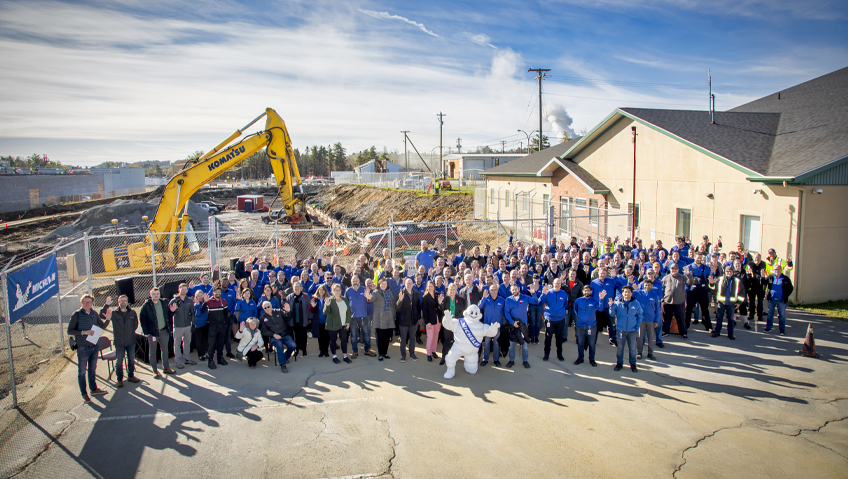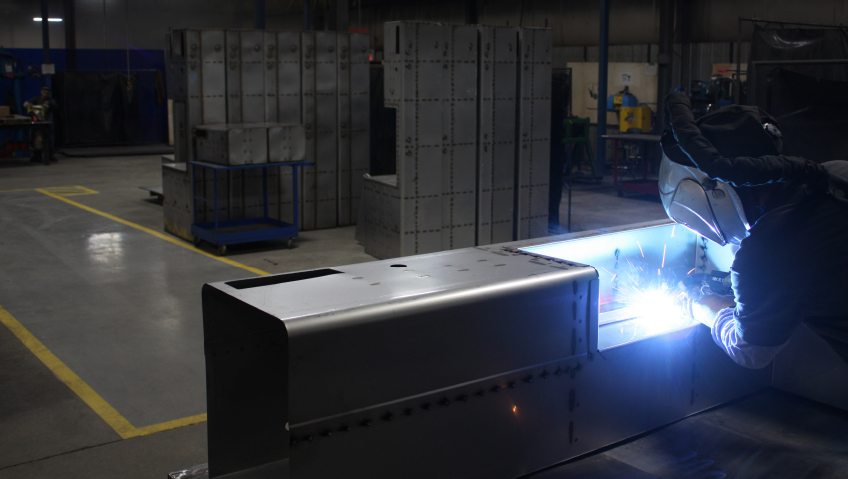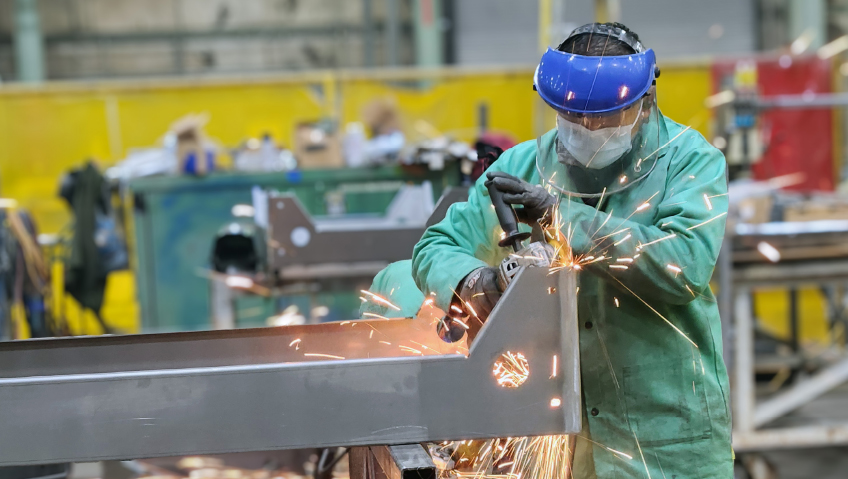The Excellence in Manufacturing Consortium (EMC) provides a depth and breadth of services, programs, and opportunities for manufacturers. Headquartered in Owen Sound, Ontario, with a national presence, EMC also encourages young people to enter the manufacturing workforce and is always looking for ways to enhance the sector.
Created “by manufacturers, for manufacturers,” EMC offers training, peer networking, business insights, conferences, benchmarking data, and reports about best practices and industry issues, among other benefits, says EMC President, Jean Pierre Giroux.
The consortium operates on “a very decentralized model. Outside of the Owen Sound office… we hire people that are on the ground where the manufacturers are,” continues Giroux. Dozens of EMC representatives in “consortium regions” across the country facilitate training and other activities, he explains. Continuing this theme, EMC programs and services are also grouped into consortiums, for easy classification.
Decentralized as it might be, EMC is dedicated to a single goal: advancing the fortunes of manufacturing firms in Canada. EMC wants to help members and non-members alike reduce costs while boosting efficiency, productivity, recruitment, retention, and technology.
Only companies can join the EMC, not individuals. All told, the consortium counts more than 1,000 firms as members, but its work reaches a far wider audience, as many of its value-added training courses and services are also available to non-members.
“I would say with confidence we have 5,000 firms that are using EMC and most of them paying for a service or getting a service directly,” says Giroux.
Manufacturing, of course, covers a wide swath, from aerospace to metal processing, food processing, plastics, textiles, automotive, and beyond. That said, roughly 20 percent of EMC’s membership consists of food processors while another 20 percent are metal processors.
Regardless of the sector they represent, member companies are generally SMEs (amall and medium-sized enterprises). Small and medium-sized businesses are companies with under 500 employees, states Innovation, Science and Economic Development Canada (small businesses have one to 99 paid employees while medium firms have 100 to 499 paid staff, adds this federal department). “Our sweet spot is between 50 and 250 employees. That’s a typical profile of an employer in our network,” shares Giroux.
Given its current stature, EMC’s origins are rather humble. Founded in the mid-1980s, EMC initially consisted of a core of 18 manufacturers in rural Ontario around the Georgian Bay area. The consortium spread across Ontario and into other provinces, incorporated in 1997, and continued growing from there.
From the start, the focus was on “collaboration—how can we help each other in a trusted environment, where executives can talk openly?” recalls Giroux.
The consortium achieves this, in part, by organizing conferences where members can gather, listen to speakers, attend workshops, exchange ideas, and network. These conferences are organized on a regional basis. “EMC used to do national conferences, but it’s quite a challenge to do these events nationally. So now we’re doing it more on a grassroots level,” explains Giroux.
In addition to conferences, “training is a big piece of what we do and is a big revenue generator at EMC,” says Giroux.
Surveys conducted by EMC revealed that manufacturers often balk at investing in training because they don’t find the content of the training sessions very relevant. “80 percent [of respondents] said, ‘We’re not investing in training because what’s available is not addressing our needs,’” says Giroux. With this in mind, EMC developed a series of focused, fact-filled training programs designed to impart new skills and/or enhance existing abilities (a process called upskilling). Training is offered both online and in-person at EMC’s Learning Centre in Owen Sound.
Manufacturing Essentials Certification (MEC) is a mainstay of EMC’s training efforts. This program accommodates supervisors and managers, maintenance workers, and production workers in different streams. The supervisors/managers segment emphasizes leadership, team management, critical thinking, and collaboration, while maintenance workers get technical training in hydraulics, pneumatics, electrical fundamentals, electrical motor controls, programmable logic controllers, and more. Production workers learn about teamwork, workplace communications, and critical thinking.
Other training courses cover employee retention, productivity, and continuous improvement, to name just a few topics. Augmenting these programs are courses that cover new ground such as Green Skills in Manufacturing (“designed for manufacturers looking to prepare for a transition to a green and low-carbon clean economy,” according to the EMC website) and Psychological Health and Safety. EMC also offers micro-credentials (essentially, certification for mastering a specific process, skill, or competency) for various manufacturing processes.
“We try to cover the full scope of skills and competency required in manufacturing… We’re very proud to say we’re addressing the needs… We’re certifying thousands of people annually,” notes Giroux proudly.
Going forward, EMC aims to keep adding new training courses. “We’re constantly adjusting or reinventing ourselves,” says Giroux.
Research also represents “a big piece of our work. We’ve been active since 2016 doing labour market [reports] and insights,” he continues.
EMC frequently surveys manufacturers to compile what it calls “Industry Pulse” reports. Recent reports have examined advanced manufacturing and green manufacturing/clean tech adoption. The green manufacturing report was developed in collaboration with Next Generation Manufacturing Canada (NGen), an industry-led non-profit group that supports advanced manufacturing and other initiatives. The document outlined ways for Canada to achieve its stated goal of “Net Zero by 2050” (under federal legislation which became law in 2021, Canada has committed to creating an economy that emits no greenhouse gases or offsets such emissions by various means within two decades). The report aims to raise awareness of climate change among manufacturers and urges firms to reduce their carbon emissions.
EMC’s eco-friendly ethos is also reflected in a new initiative called the GreenMFG Network. The Green Manufacturing Network aims to provide a forum for manufacturers, high-tech companies, government, and community partners to smooth the transition to a low-carbon economy.
Other EMC ventures include the Energy Consortium. The latter is a not-for-profit energy-buying venture established and run by EMC to assist manufacturers with energy procurement. This service has saved members over $110 million in energy costs since 2008.
Compiling best practices is another EMC speciality. The consortium has created training sessions and/or reports covering specific aspects of manufacturing, including Arc Flash Assessment and Analysis, Ergonomics, Industrial Hygiene, and Wastewater Management. EMC is currently keeping a close eye on developments in Artificial Intelligence (AI) as it relates to manufacturing.
“AI is a big topic right now,” says Giroux. “Everybody’s trying to understand how to leverage AI—same thing for virtual reality, same thing for advanced manufacturing.”
EMC also disseminates information to its members via ManufacturingGPS. A searchable, interactive Labour Market Intelligence (LMI) system, ManufacturingGPS contains statistics and information regarding industry wages, salaries, recruitment, demographics, and other areas of interest. Members can use this data for comparative purposes.
One thing EMC does not do at present is directly lobby federal or provincial regulators. That said, EMC representatives do frequently consult with government officials upon the latter’s request. The consortium also collaborates with a wide range of partners, including the Centre of Excellence – Skilled Trades & Manufacturing, the Atlantic Canada Opportunities Agency, McMaster University in Hamilton, Ontario, Simon Fraser University in Burnaby, British Columbia, and other groups.
“We’re collaborating right now with aerospace, biotech, IT, agriculture, and other groups… it’s all about partnerships, and that includes all levels of post-secondary institutions,” says Giroux.
EMC is currently working with industry and school boards in Ontario on an employment initiative for high school graduates, and is pursuing similar relationships across the country as part of a push to address a looming labour shortage. Many workers in manufacturing jobs are reaching retirement age and young people aren’t entering the sector in sufficient numbers to replace them. Addressing this labour crunch is imperative, says Giroux.
“If we don’t do this, we could be seriously in trouble as a nation that wants to manufacture. We know that demographics are not working for us… about 20 percent [of the manufacturing workforce] will move into retirement in the next 10 years. So how do you bring in the new generation? The new generation is a very big focus at EMC,” he states.
Manufacturers who want young people to enter the profession should examine their recruitment tactics and work culture, continues Giroux. Having a diverse workplace will make manufacturing more appealing for new generations, and companies that aren’t structured to welcome youth, women, new immigrants, Indigenous peoples, or workers with disabilities might find it hard to fill positions.
EMC is doing its part through an initiative called Herjourney. This yet-to-be-launched program is designed to support female apprentices in the Red Seal trades via training, resources, and mentoring. Research and supports for employers are also part of the Herjourney program.
Giroux has ambitious goals for the future of EMC. “We’re growing. We basically doubled our size in the last five years. We want to make sure we’re bringing the EMC story in a very comprehensive way, coast to coast. Working on the national level is the big focus right now—making sure we’ve got solid programing and a solid consortium in each province,” says Giroux.






